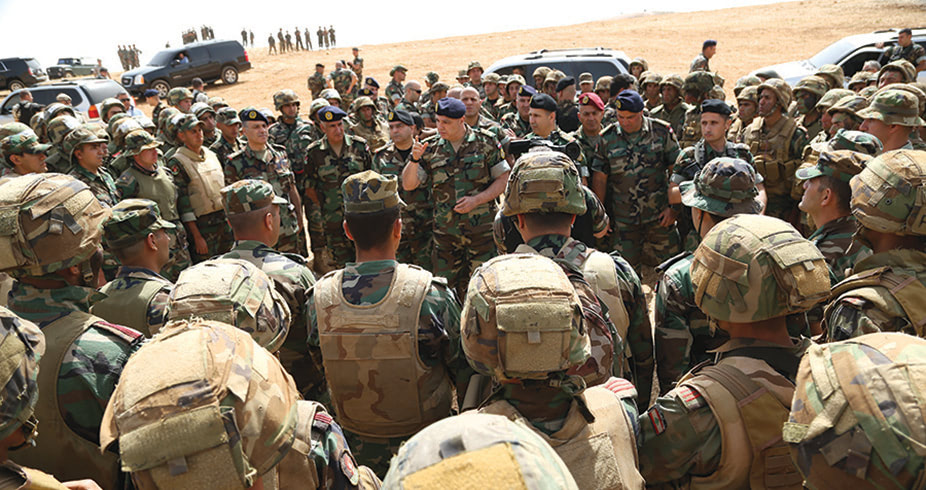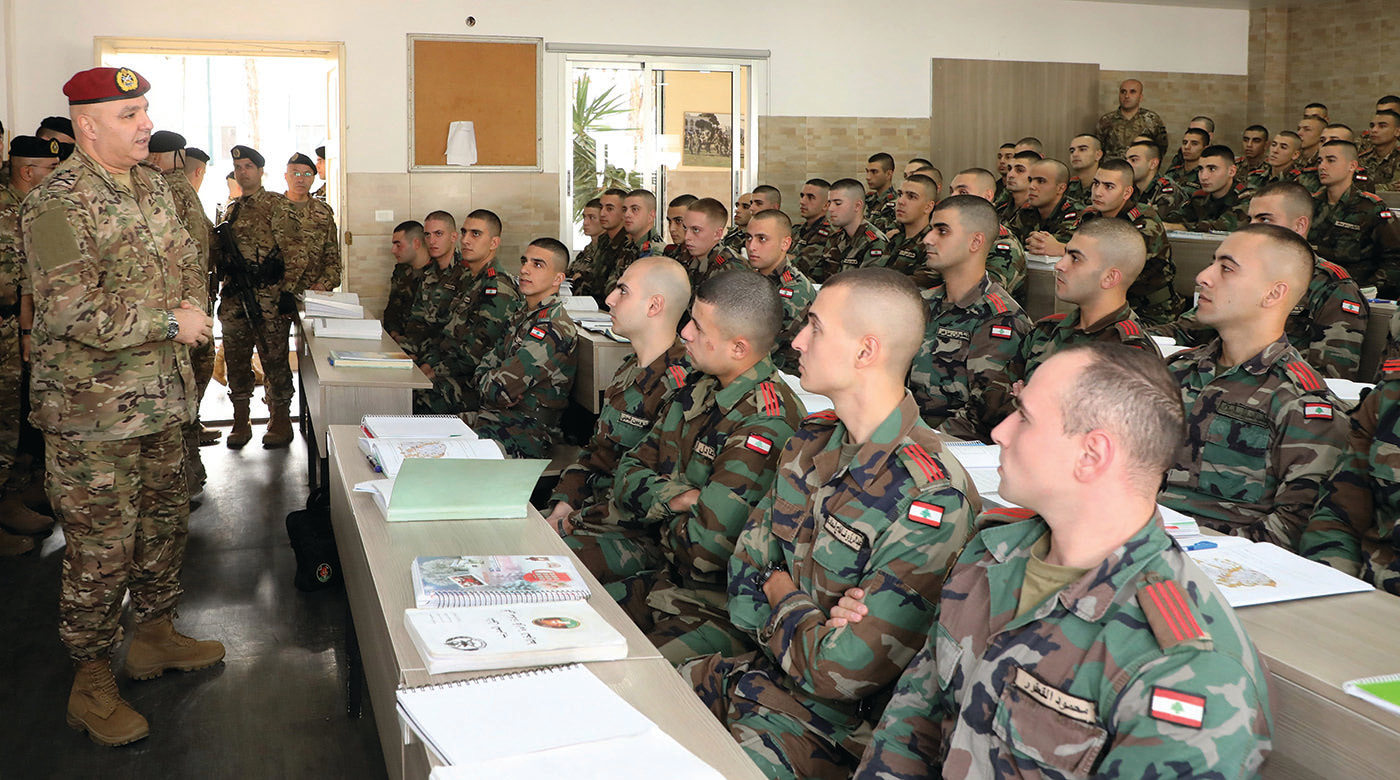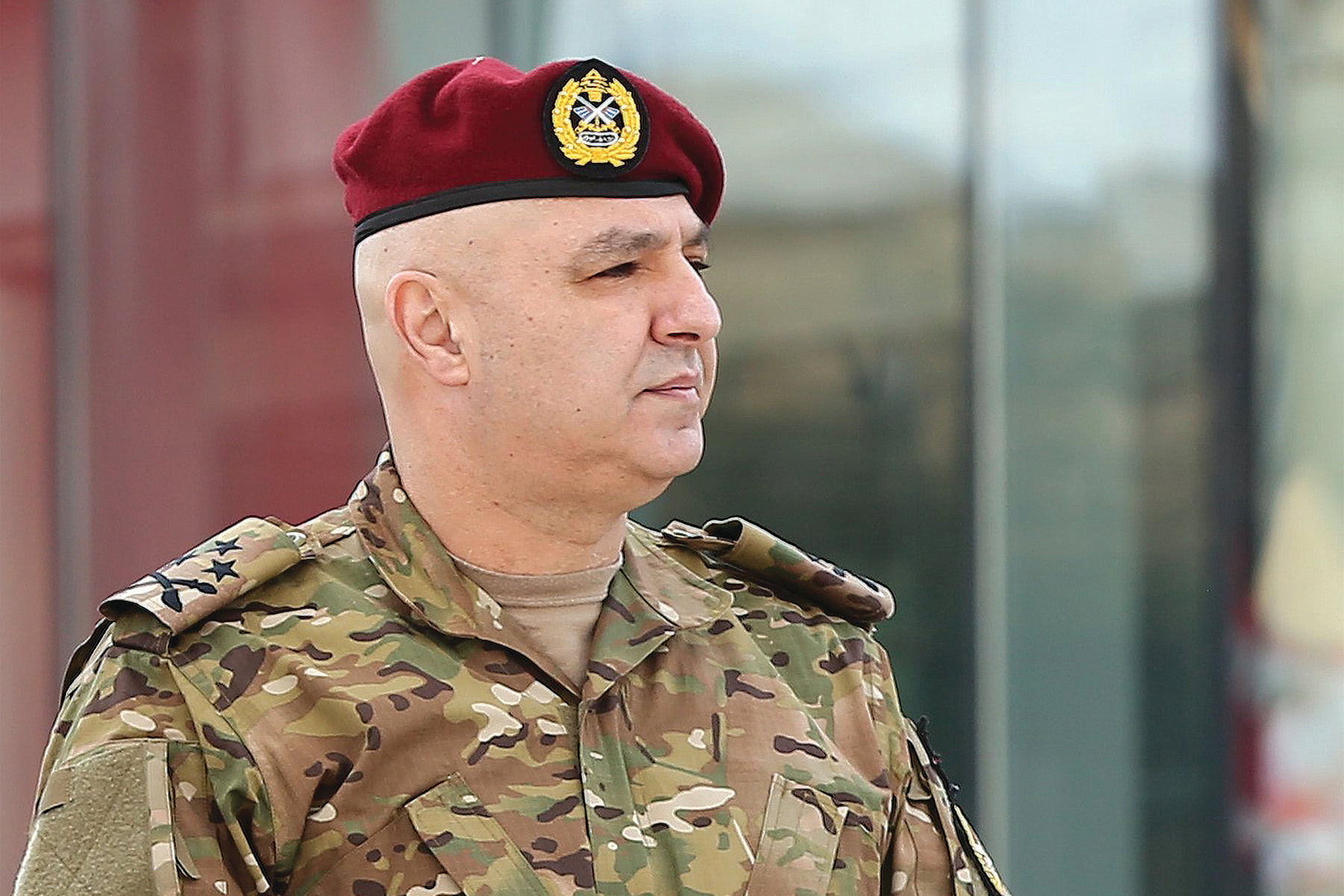From Academia to Army, an Interview with General Joseph Aoun
More in this issueThe commander-in-chief of the Lebanese army looks back at his education and how it helped him become the leader he is today.
LAU alumnus General Joseph Aoun (BA ’07) speaks about how his alma mater impacted his life and career, and how the university prepares its students for leadership and giving back.
On his time at LAU
It’s been 11 years since I graduated from the Lebanese American University with a degree in political science/ international affairs.
The university had a productive impact on my career in the Lebanese Armed Forces (LAF). It was evident that my education at LAU added to my scientific knowledge, enabling me to represent Lebanon in the best way possible, and it was a threshold to pursue my master’s in strategic studies in the United States.
“To strive, to seek, to find, and not to yield” is the university’s motto. I am still carrying it while on my military journey. Ever since its establishment in 1835, LAU has been serving the nation by spreading education for generations. It is a personal honor to serve in Lebanon’s 73-year-old armed forces, which has made sacrifices at the altar of the nation, and to have graduated from a 93-year-old institution that has the ability to change the world.
Education isn’t simply about achieving a “higher state of knowledge”; it’s about equipping students with the tools they need to go out into the world and shape it for themselves. Education can stimulate economic growth by increasing innovation, productivity and human capital.
On being a leader vs. a manager
Sun Tzu’s The Art of War – the “holy” book for military commanders written about two millennia ago – is still applicable nowadays, not only in military institutions, but in business management as well.
Some of its teachings include: The manager thinks in logic, but the leader thinks in solutions. The manager abides by laws, but the leader relies on creativity. The manager implements, but the leader excels. The manager sticks to the reachable steps, but the leader pursues larger objectives. The manager supervises the work of people and makes sure they execute their duties, but the leader motivates people to do what they have to do. Courage and sacrifice are considered the virtues of a leader.
The military officer is trained to be a leader, while the individual in civil society is trained to become a manager.
Lebanon is in need of both the manager and the leader because they complement each other. They are able to rebuild our beloved country and restore it to its previous status in history. Many wartime leadership lessons learned could be broadly applied to the world of management, and many findings have real value for managers everywhere.

On managing losses
Life is filled with challenges. You will experience failures.
Failure motivates a person to work hard to succeed; it is the most important drive for achieving success, although it can be painful and discouraging. It tests your resolve to lose one of your comrades in arms, even though you have to continue the mission to save other soldiers’ lives. In difficult times you have to motivate your troops, keep their morale high, push them to overcome challenges and recover properly afterward. One should stay firm and dignified in this experience while keeping his authority undisputed.
Life taught me that with determination powered by courage, motivation and passion, one can overcome difficulties.
On learning from mistakes
In the darkest moments, the military leader should use his tactical skills, physical ability and inner strength to execute his mission. Lessons learned are the byproduct of mistakes committed over the course of a military career. Therefore, the military leader should benefit from those mistakes to improve his performance.
On fostering a positive culture
The LAF’s mission is no longer limited to military training. Currently, the LAF is focusing on developing human capital. The army should be able to interact with the local people. Education plays a vital role in enhancing critical thinking, decision-making and the problem-solving skills needed to add value to our know-how. An officer is a combination of physical ability and education. Officers need to equip themselves with a proper education that enables them to interact with the locals and enhance their mental capabilities to make the right military decisions. Therefore, the LAF High Command constantly encourages officers to achieve a higher education. Recently, bilateral agreements were signed with the best universities in Lebanon to provide soldiers with a higher education.

On fighting corruption and building trust
During my meeting with the cadet officers who passed their military academy entrance exam, the message was clear: Be proud of yourselves, because you have succeeded with your personal capabilities and competence. We want to bestow upon the following generations a strong army because those who enroll in the military academy are the country’s future leaders, including the incoming commander in chief of the Lebanese Armed Forces. It is also a message to every young Lebanese person that the only tool needed to enroll in the military academy is their personal skills.
On his military journey
My military journey started in combat units that were deployed all over the country, enabling me to improve my military skills and leading to my assignment at the helm of the LAF. A real example is my service as the Ninth Brigade commander in the south, followed by my appointment as the commander of the Ersal Front, which helped me gain knowledge of the battlefield and thus led to the planning of Operation Fajr el Jouroud [Operation Dawn on the Outskirts] and making decisions to eradicate terrorism.
On strategy
Strategy is the bridge connecting capabilities to desired objectives. Sun Tzu developed six specific principles that capture his strategic philosophy and that apply to competitive intelligence and business strategy as well. The principles are:
- Win all without fighting
- Avoid strength, attack weakness
- Deception and foreknowledge
- Speed and preparation
- Shaping the opponent
- Character-based leadership
Basically, these six principles are the same for business, military and daily missions, though they need to be tweaked a little for each realm. Here is a proposal on how they would appear if applied to warfare:
- Win all without fighting: achieve the objective without destroying it
- Avoid strength, attack weakness: strike where the enemy is most vulnerable
- Deception and foreknowledge: win the information war
- Speed and preparation: move swiftly to overcome resistance
- Shaping the opponent: prepare the battlefield
- Character-based leadership: lead by example
And another proposal on how they would appear if applied to business:
- Win all without fighting: capture your market without destroying it
- Avoid strength, attack weakness: strike where they least expect it
- Deception and foreknowledge: maximize the power for market information
- Speed and preparation: move swiftly to overcome competitors
- Shaping the opponent: employ strategy to master the competition
- Character-based leadership: provide effective leadership in turbulent times
On the lessons he’s learned
Life is filled with challenges and is therefore determined by how you face them. It doesn’t matter if you fall down, as long as you have the will to stand up again. Experience is an accumulation of mistakes committed throughout life – each and every one should be learned from.
Failure is not about not succeeding; it is about not trying.
You are the future generation – the leaders and the managers of tomorrow, who will build the world and the ones who can affect the lives of people in the next century. It will not be easy. Start each day with the will to achieve your task.
Be honest, compassionate, loyal and transparent, respect your colleagues and have a sense of selfless service.
Arm yourself with courage and kindness. Know that life is not fair, and that you will fail often. However, never give up – overcome your fear by facing it. Equip yourself with the will to encounter the challenges of life.
Serve with integrity, lead with courage and act with love in your heart. Have the wisdom to master your life intelligently by having without possessing, acting with no expectations, leading and not trying to control. These are supreme virtues.
